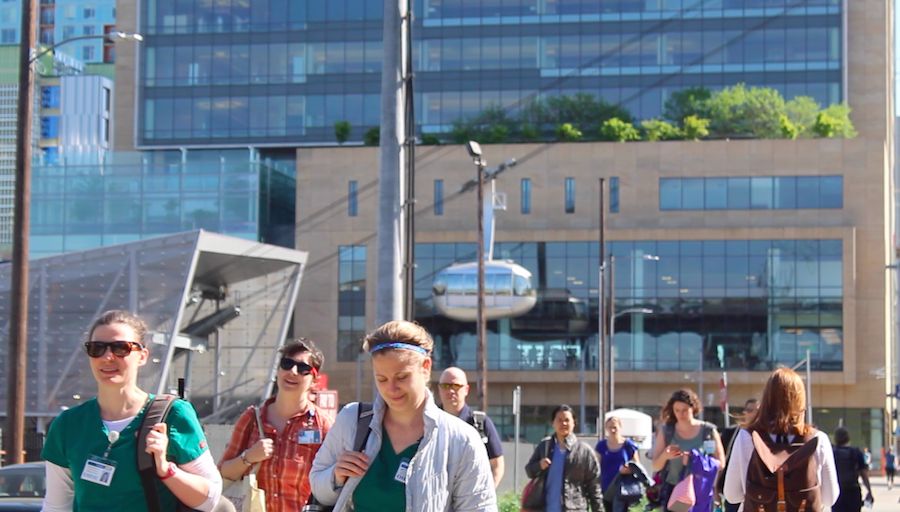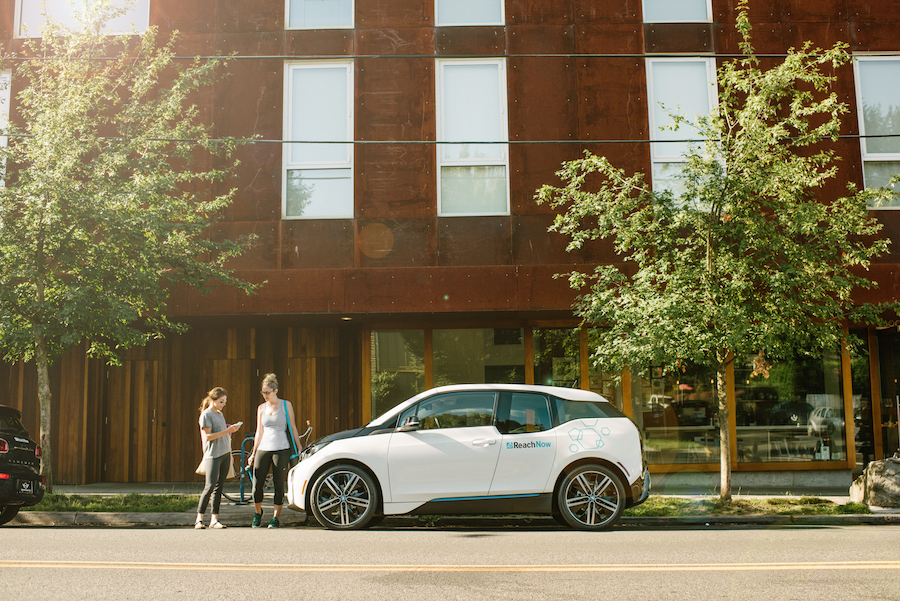Private companies expand employee transportation options as TriMet beefs up service and regional government anticipates transit bond measure.
As Metro gears up for a $1.7 billion transportation bond in 2020, area employers are taking congestion mitigation into their own hands.
Newly elected Metro president Lynn Peterson wants transportation planning to take a big leap forward. One of her top priorities when she takes office in January 2019 will be the transportation bond. It’s “incredibly necessary right now,” Peterson says.
The measure, to include funding for a Southwest Corridor light rail line, was originally envisioned as a TriMet-led initiative for 2018. The transit agency pushed the bond back to 2020, and handed the baton to Metro.
The Metro bond is not much of a leap forward compared to the $54 million transit bond the Seattle metro area passed in 2016. And any projects funded by the Metro measure are years down the road.
More immediate fixes are coming down the pike as TriMet ramps up service, thanks to the $55-$60 million expected annually from the transportation package passed last year.
Meanwhile, Oregon employers aren’t waiting for public agencies to solve their traffic problems. In April Oregon Health & Science University started subsidizing access to the carpooling app Scoop, a startup headquartered in the Bay Area. Intel struck a partnership with car-sharing outfit ReachNow.
 Employees at OHSU’s Southwest Waterfront campus.
Employees at OHSU’s Southwest Waterfront campus.
Parking fills up quickly at OHSU, and many medical professionals work irregular schedules, says Brett Dodson, OHSU’s director of transportation and parking. “We’ve had a hard time getting carpools to work.”
Enter Scoop, an app that places employees in a carpool, maps an efficient route for the driver and lets participants split the cost of the ride.
 Jon Sadow, co-founder of Scoop
Jon Sadow, co-founder of Scoop
The OHSU deal marks Scoop’s entrance into a fourth major metro area.
“Transportation is an everybody issue — public and private, high and low income,” says co-founder Jon Sadow. “We’re all feeling the impact of single-occupancy vehicles on the road.”
Scoop earns a fee from OHSU to market the app to employees and ensure it runs smoothly (both OHSU and Scoop declined to say how much). Part of that fee goes back to reducing how much riders pay.
About 1,200 OHSU employees have signed up, accounting for around 100 rides per day, Dodson says.
Most of the users are OHSU commuters, but anyone can download the app. As more people sign on, Scoop’s algorithm will choose more efficient routes. The app’s effectiveness, Dodson says, is “just a matter of how many people we can get signed up.”
 ReachNow will place cars on Intel’s four campuses.
ReachNow will place cars on Intel’s four campuses.
ReachNow also has a plan for thinning congestion on the West side: Add more cars.
Shared cars, that is. BMW’s carsharing service announced last week that it will park its Beemers, including electric i3s, and MINI Coopers, on the four Hillsboro-based Intel campuses.
Many of Intel’s 20,000 plus employees, ReachNow CEO Steve Banfield says, drive their private cars to work, “just in case.”
With shared cars, they can ride transit and bike with greater confidence. They will have a backup if the bus is late, or if rain dampens their ride.
“If you have more options,” Banfield says, “that gives you more ways to look at your daily commute.”
The city of HIllsboro is eager to jump onboard. “Having their [ReachNow’s] presence out here will definitely move the needle in the right direction,” says Hillsboro transportation planning engineer Don Odermott. “It creates flexibility.”
Both companies hinted at expansion plans in Portland. Scoop is in talks with several Portland employers. ReachNow is also “actively talking to other folks” about partnerships, Banfield says.
Car sharing and carpooling alone won’t make a serious dent in Portland area-traffic.
Hillsboro has a “desperate need” for traditional transit infrastructure, Odermott says. About 51,000 people work in Hillsboro, and 73% of them drive to work alone, according to the 2016 American Community Survey. The average family owns two cars.
Metro area needs to speed up public transit projects, Peterson says. “I was taught as a planner we do a few miles of light rail at a time,” she says, “and in 30 years we have a system.”
“The intent isn’t to get people to drive,” Banfield says, “or to use these cars to the exclusion of transit.”
Rising congestion and population growth have challenged that approach. The West side needs large-scale transit upgrades; hence the bond measure, Peterson says. And while private sector solutions like Scoop and ReachNow help solve employee commutes, the growing number of partnerships between employers and (auto-based) urban mobility companies also raises questions about eroding transit ridership.
TriMet ridership has been flat or declining for the past few years. Between this January and the pervious year it dropped 1.4%.Some blame car and ridesharing companies.
For their part, tech transport companies say they don’t want to be a drain on buses or light rail. The intent isn’t to get people to drive,” Banfield says, “or to use these cars to the exclusion of transit.”
Propelled by House Bill 2017, TriMet’s proposed $710 million budget includes funding for a low-income fare program, 24-hour service and 64 new buses. Where there are gaps in funding, Peterson says the region needs small, low-budget projects to buy time until the bond measure goes through.
“It may just give us eighteen months to five years,” she says. “but we need that.”
To subscribe to Oregon Business, click here.








